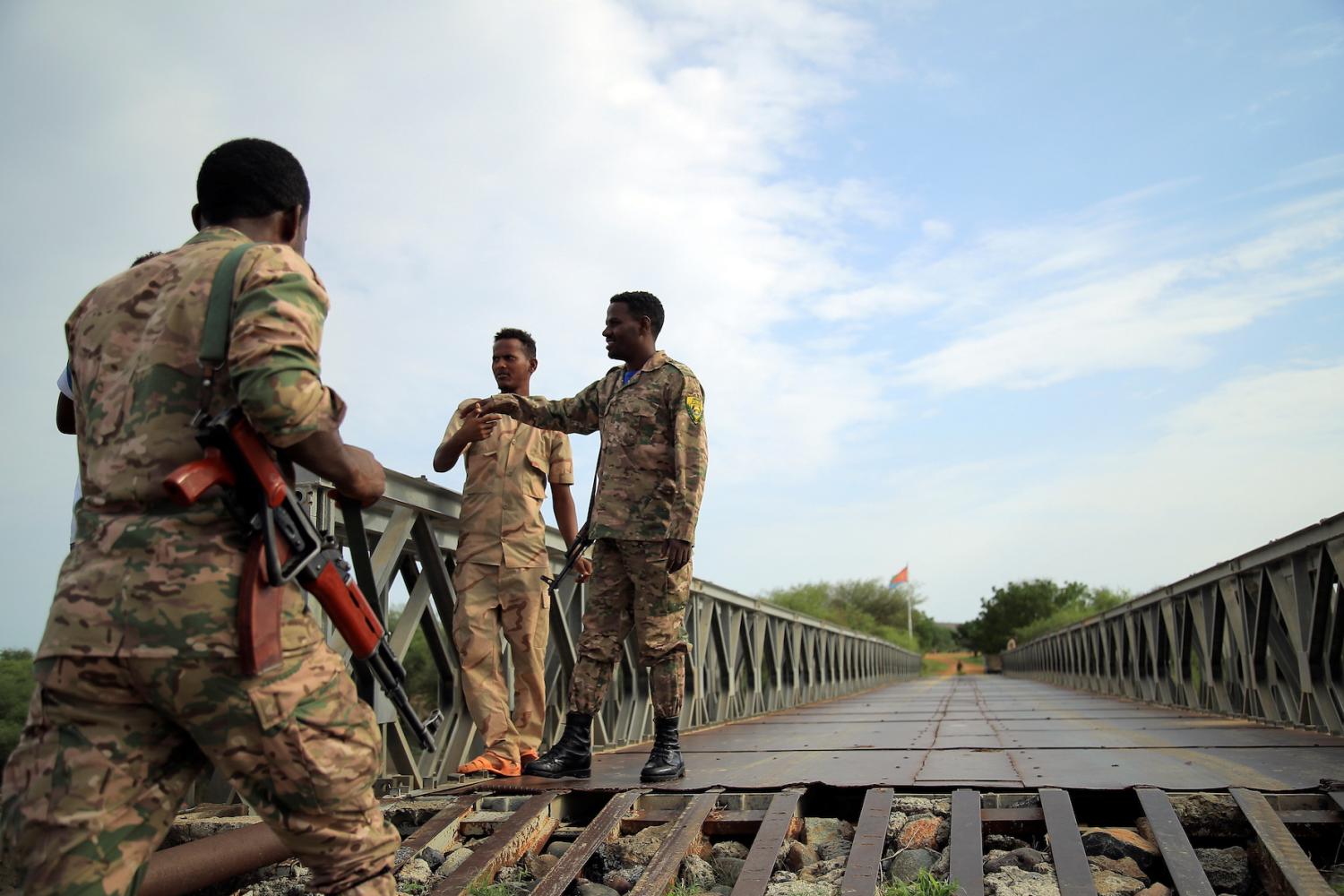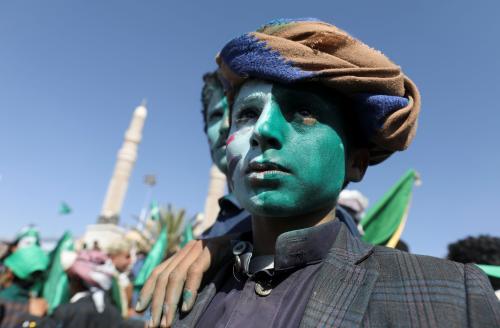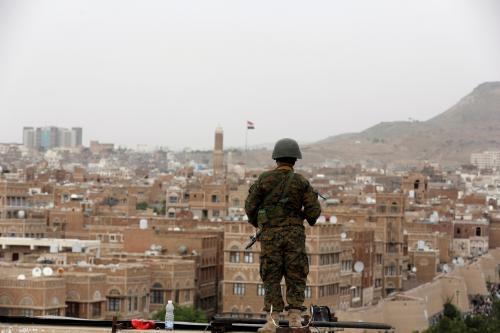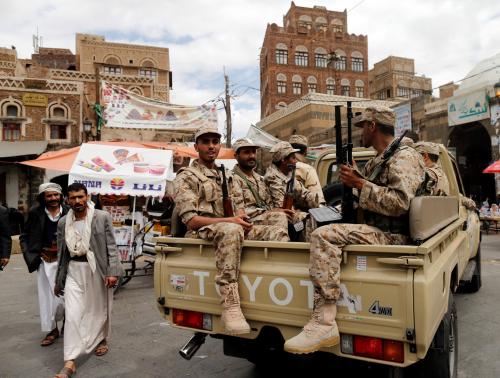This piece is part of a series titled “Nonstate armed actors and illicit economies in 2024” from Brookings’s Initiative on Nonstate Armed Actors.
Amid the growing promise of a Yemen peace process, on one hand, and the Houthi’s escalating use of force against international actors, on the other, the decisions the Houthis make in 2024 will represent a turning point for their relationship with the international community as well as Yemen’s trajectory.
The Houthis’ attacks on Red Sea shipping and confrontation with the United States provide them with significant short-term benefits: By presenting themselves as the defenders of Palestine, the Houthis have quelled growing domestic dissent over their poor governance and asserted themselves as a regional player.
The attacks have significant costs for Yemen and the Houthis, however. If they persist, they threaten to perpetuate a state of “no peace, no war” and isolate a country dependent on international support. While regional and international actors will seek to avoid a major re-escalation of hostilities in Yemen, the Houthis’ actions are eroding the prospects of international support for Yemen’s peace process and economic recovery. The consequences of this will be far greater than those of the targeted strikes against Houthi military assets.
The Houthis seem to be dismissing these consequences. Iran, which has provided years of military support and the expertise that helped enable the Houthis’ attacks, is itself largely immune to the consequences. This increases the risk that the Houthis or Iran may continue to use the latter’s attacks on international shipping to extract concessions even after the Israel-Gaza crisis ends.
Quiet progress in Yemen’s peace efforts
Nearly a decade of devastating conflict created the world’s largest humanitarian crisis and upended stability in the Arab Gulf as Saudi Arabia and the United Arab Emirates sought to reverse a Houthi takeover of most of northern Yemen. But there have been no major changes to the war’s frontlines since 2018.
Over the past decade, the Houthis have cemented their control over much of northern Yemen. Through peace efforts, they seek to formalize that role and gain access to Yemen’s oil and gas resources — control they failed to secure militarily. Unlike the Taliban in Afghanistan, the Houthis have not demonstrated the ability to seize the entire country by force. Hostility toward the Houthis is particularly strong in southern Yemen, which was an independent country prior to 1990 and which houses much of Yemen’s oil reserves and natural gas infrastructure.
The April 2022 truce between the Houthis, the internationally recognized Yemeni government, and the Saudi-led coalition supporting the government ushered in a new era of de-escalation in Yemen. The truce — mediated by the United Nations with strong U.S. and regional support — has saved thousands of lives and disrupted a dangerous spiral of regional escalation. For over a year, however, it was unclear if the truce provided a path to peace and recovery in Yemen. That changed last month, when the U.N. special envoy for Yemen announced that the Houthis and the Yemeni government were preparing to resume a political process. Exhaustive diplomacy finally secured support from the Houthis, a growing number of armed groups associated with the government, and major regional players for the basic contours of a peace process.
The Houthis’ miscalculation and the costs of isolation
It was not the U.N. announcement that featured in international headlines in December, however, but news of continued Houthi attacks on international shipping. At the time of writing, over 28 ships associated with over 55 countries — more than a quarter of all countries in the world — have been threatened by Houthi attacks. Several of the ships have no current affiliation with Israel.
The Houthis’ leaders erroneously believe they can secure international legitimacy while continuing to disregard basic tenets of international law. In doing so, the Houthis seem to be confusing the international community’s efforts to avoid re-escalation in Yemen with acceptance of their behavior.
In reality, the cost of continued Houthi attacks may be devastating isolation, as both international and regional partners withdraw much-needed diplomatic support, assistance, and economic cooperation.
The recent confrontation between the Houthis and the United States has significantly escalated the situation, but it is still possible to de-escalate. Doing so will require the Houthis to think beyond the short-term benefits of their attacks and choose their next steps carefully.
Yemen amid foreign dependency and domestic crisis
Yemen’s peace process is dependent on proactive international support. Intense engagement from the United States and other U.N. Security Council (UNSC) members, including corralling buy-in from a variety of regional players and Yemeni groups, was essential for Yemen’s peace efforts to advance over the past two years. Without it, that consensus is likely to falter, regional attention will wane, and Yemeni groups that are deeply unhappy with peace efforts may turn into spoilers. Even if the political process hobbles on, the UNSC would likely be unable to endorse a transitional government led by the Houthis if the group continues to actively disrupt freedom of navigation and attack civilians from dozens of U.N. member states.
Yemen is facing a dire economic and humanitarian crisis. Basic services have collapsed, leaving 21.6 million people in need of humanitarian assistance. A quarter of the population has no income because economic activity has crumbled. As a result of the political turmoil, southern Yemen suffers from rampant inflation while northern Yemen faces a major liquidity crisis. While the Houthis have long blamed Yemen’s humanitarian crisis solely on import restrictions imposed by the Yemeni government and Saudi-led coalition, the drivers of the crisis are much broader. Only a resolution of Yemen’s political turmoil and a full-scale, internationally-backed recovery effort can begin to reverse the suffering.
The U.N.-negotiated peace process roadmap reportedly includes short-term Saudi financing for public sector salaries and other economic incentives. But the longer-term economic benefits that a peace process could bring are much more significant. The last donor conference to support a peace and transition process in Yemen (in 2012) generated $6.4 billion in promised aid. Potential economic cooperation between Yemen and the Gulf Cooperation Council (GCC) could bring in larger and sustained payoffs.
Yemen’s prospects for economic recovery are also dependent on foreign investment, driven by commercial as well as political considerations. Yemen’s largest and most lucrative industrial projects are controlled by international shareholders. These include the Yemen Liquified Natural Gas (YLNG) project, which has been under force majeure since 2015 but could provide the single largest source of revenue for the government. YLNG’s major shareholders — including French TotalEnergies and U.S. Hunt Oil — want to see greater political stability before they restart production. They also need to be convinced that the Houthis will not engage in the kind of extortion, intimidation, and unlawful seizures that have characterized Houthi interactions with Yemen’s private sector. YLNG export is not feasible as long as the Red Sea is under attack.
Absent such foreign investment, the math simply does not add up. The Houthis have resorted to extreme measures to generate revenues in the areas they control but independent estimates place their revenues at roughly $1.8 billion annually. When the Yemeni government still exported oil, its revenues from areas under its control were approximately $1.4 billion. These levels barely cover Yemen’s public sector salaries — $5.3 billion in 2014 (though inflation brings the U.S. dollar conversion down to $2.1 billion based on the Sanaa exchange rate).
None of these benefits — a donor-backed recovery process, economic cooperation with the GCC, or the return of foreign investment and access to Yemen’s largest peace dividends — will materialize if Yemen remains in a “cold peace” with no internationally backed political resolution, or if the Houthis fail to convince their neighbors that a government they lead can ever be a reliable partner.
The Houthis’ actions threaten to turn Yemen into a pariah state without any viable means for economic recovery, dooming the country to a slow death. Even the short-term benefits provided by a roadmap agreement could disappear if the Houthis’ belligerence drives the United States to re-designate them as a foreign terrorist organization.
With 90% of its basic goods imported, Yemen’s economic recovery also depends on regularizing imports. Addressing Yemen’s food security crisis requires driving down prices by increasing the number of imports and decreasing the costs shippers incur to transport goods. Yet the Houthis’ attacks against ships in the Red Sea are driving up the costs for the few shippers still willing to make the perilous journey, such that Yemenis may be their biggest casualty.
The Houthis’ disregard for international principles even threatens essential humanitarian assistance. After months of negotiations in 2023 and the Houthis’ persistent interference in aid operations, the World Food Program was forced to suspend food aid to millions of Yemenis because the Houthis would not permit it to target aid to those in the greatest need.
Making a choice
Can the Houthis be convinced of the consequences of belligerence against the international community? And do they care? The answer to the first question will depend on whether major international actors (not only the United States) deliver clear, unified messaging regarding the specific consequences the Houthis’ action may trigger. Support from countries like Oman who benefit from relations with the Houthis and would suffer repercussions from further isolation and instability in Yemen is also essential.
Answering the second question is more difficult. Yemeni civilians will suffer most from Yemen’s isolation, but the Houthis will feel the consequences. The Houthis have already found it difficult to maintain control amidst the “no peace, no war” conditions that have persisted since April 2022. Yemen’s private sector has helped push back against bad Houthi decisions in the past, but not ones directly connected to Houthi military strategy. And the loudest voices within the Houthi movement appear to now be military leaders, not those responsible for governing.
The international community must make it clear that the Houthis need to make a decision, but ultimately the choice rests with them.
-
Acknowledgements and disclosures
The views expressed in this article are the author’s own, and not necessarily those of the U.S. government.
The Brookings Institution is committed to quality, independence, and impact.
We are supported by a diverse array of funders. In line with our values and policies, each Brookings publication represents the sole views of its author(s).








Commentary
An inflection point for the Houthis
January 16, 2024